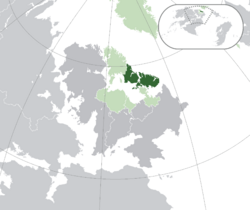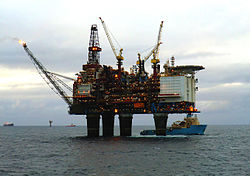Rosland-Iskrell: Difference between revisions
| Line 152: | Line 152: | ||
=== Contemporary history === | === Contemporary history === | ||
The [[Deluge]] in Rosland-Iskrell was heavily influenced by the activities of the [[People's Front for Liberation]], a {{wp|far-left}} {{wp|militant group}} that operated from 1988 to 2001. This group carried out {{wp|assassination}}s and {{wp|terrorist attack}}s both domestically and internationally, including a {{wp|hostage situation}} at the [[East Ruthen|East Ruthish embassy]] in [[Waldrich|Alsvik]] in 1989 and the hijacking of [[KFS Flight 724]] in 1994. Violence peaked in March 1993 during the so-called [[Ornsholt Spring]], marked by a series of attacks that included seven assassinations within two months. A subsequent crackdown on the group led to its dissolution by 2001. | |||
== Geography == | == Geography == | ||
Revision as of 16:55, 22 December 2024
This article is incomplete because it is pending further input from participants, or it is a work-in-progress by one author. Please comment on this article's talk page to share your input, comments and questions. Note: To contribute to this article, you may need to seek help from the author(s) of this page. |
Kingdom of Rosland-Iskrell | |
|---|---|
| Motto: Vi står fast ("We stand firm") | |
| Anthem: "Nordmarch" "Norra Marsch" "Northern March" | |
 | |
| Capital and largest city | Ornsholt |
| Official languages | Iskron Roskan |
| Ethnic groups (2023) | 53.2% Iskron 41.3% Roskan 5.5% other |
| Religion (2023) | 63.4% Gregorianism 32.5% Irreligious 4.1% Others |
| Demonym(s) | Roskan-Iskron Iskron Roskan |
| Government | Federal parliamentary consitutional monarchy |
• King | Gregers VI |
| Casper Öberg | |
| Ulf Mørk | |
| Irma Hagström | |
| Legislature | Folkemødet |
| Establishment | |
• TBA | TBA |
• TBA | TBA |
• TBA | TBA |
• TBA | TBA |
• TBA | TBA |
• TBA | TBA |
| Area | |
• Total | 285,049 km2 (110,058 sq mi) |
• Water (%) | 3.8 |
| Population | |
• 2024 estimate | |
• 2022 census | |
• Density | 169.1/km2 (438.0/sq mi) |
| GDP (PPP) | 2022 estimate |
• Total | |
• Per capita | |
| GDP (nominal) | 2022 estimate |
• Total | |
• Per capita | |
| Gini (2022) | medium |
| HDI (2022) | very high |
| Currency | Pund (RIP) |
| Time zone | UTC±0 |
| Date format | dd-mm-yyyy |
| Driving side | left |
| Calling code | +38 |
| Internet TLD | .ri |
Rosland-Iskrell (Iskron: Rosland-Iskrona, Roskan: Rosland-Iskrellen), officially the Kingdom of Rosland-Iskrell (Iskron: Kongeriget Rosland-Iskrona, Roskan: Konungariket Rosland-Iskrellen), is a sovereign state located in Svalland in Northern Calesia. It lies between the North Sea to the north, Waldrich to the west, and the Swarin Sea and East Ruthen to the south. Remote Kongerikøen Island, located in the South Medan Ocean, is a dependency of Rosland-Iskrell. The capital and largest city in Rosland-Iskrell is Ornsholt.
Rosland-Iskrell was part of the Waldic Empire from the 9th century until the early 11th century. Following the sack of Sydenham in 1031, the Empire transitioned into a loose defensive alliance called the Old Waldish Confederacy which controlled the majority of modern day Rosland. This confederacy remained largely untouched until the Catabole in the mid-14th century. During the !Reformation, most of the Roskans embraced Presterism. In 1472, Presterist nobles launched a rebellion against the repression from Alsvik, igniting a continental war that ultimately led to Waldrich's defeat. In the aftermath, nobles from the neighbouring kingdom of Iskrell united swiftly with the Roskans and established a personal union under King Olaf I of Iskrell. This kingdom, alongside the Ruthish Confederation, became one of the few major Presterist powers in Calesia and even established a small colony in Elia Australis. The kingdom also established a modest colonial empire in Hylasia, however, it remained a minor power on the world stage.
Rosland-Iskrell, a staunch ally of Waldrich, swiftly joined the Transmedan Powers at the start of the Great War and was soon invaded by Ruthish forces, leading to a brutal five-year conflict. The tide turned in 1938 with the liberation of the capital in August, and by late 1939, Ruthish forces were fully expelled. The nation has remained a loyal ally of Waldrich, playing an increasingly active role in international politics after the Great War. It has participated in the Chaibian War and contributed to the UCMAR peacekeeping force. Economically, Rosland-Iskrell began to prosper significantly in the 1970s, when oil began to be pumped from the North Sea. The country assembled a sizable state-owned company sector relatively quickly to support the state economy, and the country's standard of living began to rise.
Rosland-Iskrell is a Federal parliamentary consitutional monarchy, the current monarch being Gregers VI. The nation is a member of the United Congress and the Nordbund.
Etymology
History
Prehistory
Middle Ages
Early modern period
Later modern period
Great War
Contemporary history
The Deluge in Rosland-Iskrell was heavily influenced by the activities of the People's Front for Liberation, a far-left militant group that operated from 1988 to 2001. This group carried out assassinations and terrorist attacks both domestically and internationally, including a hostage situation at the East Ruthish embassy in Alsvik in 1989 and the hijacking of KFS Flight 724 in 1994. Violence peaked in March 1993 during the so-called Ornsholt Spring, marked by a series of attacks that included seven assassinations within two months. A subsequent crackdown on the group led to its dissolution by 2001.
Geography

Climate
Biodiversity
Politics and government
Administrative divisions
Largest populated areas
Law enforcement
Human rights
Foreign relations
Military
Economy
Oil industry
Transport
Tourism



